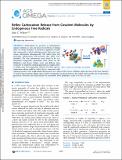Reflex carbocation release from covalent molecules by endogenous free radicals
Abstract
Carbocations are pervasive in contemporary organic synthesis, so new and innocuous methods of making them are always desirable. A theoretical approach revealed that compounds in which radical generation takes place may release carbocations advantageously. The radical types and molecular substructures that promote this effect were identified. The best substructures were found to be 1,3-dicarbonyl compounds, particularly those based on the Meldrum's acid theme. Sulfate esters and dithiane rings could also be employed. Radicals generated on oxygen atoms or ethyne units were particularly effective. For these species, carbocation release could be reflex, that is, concurrent with radical generation. Only small radical enhancements were observed for release of lithium cations because of the ionic character of most of the precursors. Ethyne units could be incorporated as spacers between the radical center and the site of carbocation generation. Moreover, the enhancement was transmitted down polyethyne chains of at least six units.
Citation
Walton , J C 2018 , ' Reflex carbocation release from covalent molecules by endogenous free radicals ' , ACS Omega , vol. 3 , no. 10 , pp. 13290-13297 . https://doi.org/10.1021/acsomega.8b02307
Publication
ACS Omega
Status
Peer reviewed
ISSN
2470-1343Type
Journal article
Description
J.C.W. thanks EaStCHEM for financial support.Collections
Items in the St Andrews Research Repository are protected by copyright, with all rights reserved, unless otherwise indicated.

